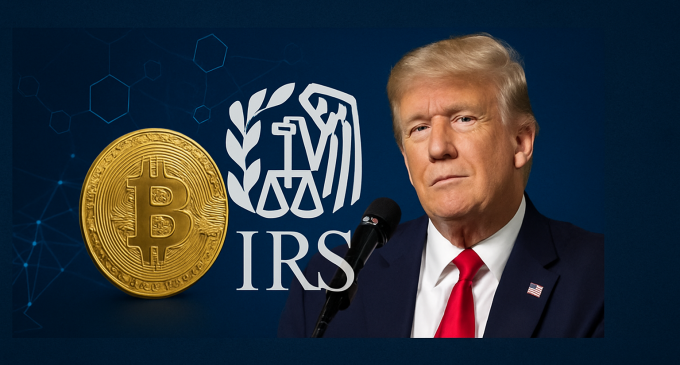
Introduction
In a landmark move that could redefine the future of decentralized finance (DeFi) and crypto regulation in the United States, former President Donald Trump has signed a congressional resolution repealing an IRS rule that would have imposed strict reporting requirements on DeFi platforms. The repealed rule, known among the crypto community as a controversial overreach, mandated that decentralized exchanges and protocol developers report user transactions to the Internal Revenue Service (IRS), similar to traditional financial institutions. With the repeal now formalized, the regulatory landscape surrounding DeFi is poised for significant transformation.
The repeal has generated waves of both celebration and concern. Supporters hail the decision as a long-overdue recognition of decentralized systems’ unique structure and an affirmation of financial freedom in the digital age. Critics, on the other hand, argue that this could pave the way for increased tax evasion, regulatory blind spots, and illicit financial activity.
Understanding The Repealed IRS Rule
To fully grasp the importance of this repeal, it is necessary to understand what the original IRS rule sought to accomplish. The rule, which had been introduced as part of the broader Infrastructure Investment and Jobs Act of 2021, required that digital asset brokers report customer transactions to the IRS. The IRS later clarified that the term “broker” could include not only centralized exchanges like Coinbase or Binance US, but also decentralized platforms, software developers, wallet providers, and liquidity pool creators—essentially anyone facilitating a DeFi transaction.
This rule sent shockwaves through the crypto community. Critics argued that it was impossible to comply with such regulations in a decentralized context where no single entity controls the protocol or has access to user identity. Privacy advocates and blockchain developers expressed serious concerns about the feasibility and legality of forcing open-source projects to collect personal financial data on users. The regulation was viewed as a fundamental misunderstanding of how DeFi operates.
The Trump Administration’s Position On Crypto Regulation
Donald Trump’s stance on cryptocurrency has evolved over time, and his latest decision to sign the repeal into law signals a sharp pivot in federal regulatory approach. Early in his presidency, Trump expressed skepticism about digital currencies, calling Bitcoin a “scam” and promoting traditional dollar-based policy. However, as political momentum grew around digital innovation and individual financial sovereignty, Trump recalibrated his public messaging. His 2024 campaign began emphasizing deregulation, decentralization, and the need to reduce governmental interference in emerging technologies.
The repeal of the IRS DeFi reporting rule was aligned with these broader political goals. By signing the resolution into law, Trump positioned himself as a defender of financial privacy, a champion of American innovation, and an opponent of excessive government oversight. His supporters see this move as emblematic of a wider pro-crypto, pro-freedom ideology aimed at empowering entrepreneurs and developers.
Political Dynamics Behind The Repeal
The bill to repeal the IRS rule did not emerge from the executive branch alone—it had to pass through both chambers of Congress. The resolution gained strong support from key Republican lawmakers who argued that the rule stifled innovation, created compliance nightmares, and treated decentralized software protocols as financial intermediaries. Several influential members of the House Financial Services Committee voiced concerns that the rule, if enforced, would drive innovation offshore and put American developers at a disadvantage.
Democrats were more divided. Some progressive members emphasized consumer protection, data transparency, and regulatory clarity. Others, particularly from tech-forward districts, warned of the economic costs of overregulation. In the end, a bipartisan coalition formed around the idea that regulation should be tailored to the technical realities of blockchain, not retrofitted from traditional finance.
Reactions From The Crypto Industry
Crypto leaders and DeFi pioneers have largely welcomed the repeal as a victory for common sense and innovation. Leading figures in the blockchain community, including developers of protocols like Uniswap, Aave, and Compound, expressed relief that the looming threat of impossible regulatory expectations had been lifted.
“This is a major milestone in the fight for decentralized financial freedom,” said Erik Voorhees, a long-time crypto entrepreneur. “Forcing DeFi developers to report on user activity was both technologically impossible and ethically dangerous. It would have destroyed open-source finance in the U.S.”
Others noted that this repeal could open the door to a more nuanced, tailored approach to crypto regulation. The hope is that lawmakers and regulators will now engage more deeply with developers, economists, and privacy experts to build frameworks that protect consumers without stifling the core innovations of blockchain.
Concerns About The Repeal’s Consequences
While many in the crypto world celebrate, some regulators, economists, and political analysts have sounded alarms. Without clear rules, they argue, DeFi could become a hotbed for money laundering, tax evasion, and financial manipulation.
The IRS itself had previously justified the rule by pointing to the difficulty in tracking crypto-related tax liabilities. In its absence, the burden of voluntary compliance now falls on individuals—many of whom may lack the knowledge or tools to properly report DeFi income.
Some consumer watchdog groups worry that deregulation could result in predatory behavior from anonymous developers or unchecked risks in volatile DeFi protocols. These groups are calling for new, crypto-native regulatory models that balance innovation with accountability.
Implications For Global Crypto Policy
The United States’ decision to repeal the IRS rule has already captured global attention. Regulators in the European Union, Singapore, Japan, and the United Kingdom are closely watching how the American experiment with crypto deregulation unfolds. In regions where DeFi adoption is rising rapidly, policymakers are weighing how to accommodate innovation while avoiding regulatory arbitrage.
The U.S. repeal may embolden developers and entrepreneurs to flock to American markets, but it could also strain relationships with international regulatory bodies that have pushed for harmonized crypto oversight. This divergence could lead to a fragmented global regulatory environment, where companies must navigate widely different rules depending on jurisdiction.
A New Chapter For DeFi And Decentralized Innovation
The repeal of the IRS rule marks a critical turning point in the story of decentralized finance. As regulators, developers, and users begin to navigate this new landscape, questions arise about the future of crypto oversight, taxation, and legitimacy.
While Trump’s move may have cleared one major obstacle, the need for thoughtful, adaptive regulation remains. Industry leaders are now calling for a collaborative approach—where government agencies, blockchain innovators, and civil society groups work together to create rules that are both effective and fair.
Looking Ahead: What’s Next For U.S. Crypto Regulation?
In the wake of the repeal, attention now shifts to the Securities and Exchange Commission (SEC), Commodity Futures Trading Commission (CFTC), and other agencies that may try to fill the regulatory void. Questions persist over how securities laws apply to DeFi tokens, how lending protocols should be monitored, and whether stablecoins require special regulatory treatment.
Legislators have hinted at new bills aimed at defining digital assets, establishing clear tax guidelines, and promoting regulatory sandboxes. The crypto industry, meanwhile, is lobbying for safe harbor provisions that would protect developers from prosecution while enabling innovation.
As these discussions unfold, the repeal of the IRS DeFi rule will be remembered as a pivotal event that redefined the relationship between digital finance and government oversight in America.
Conclusion
Donald Trump’s repeal of the IRS DeFi reporting rule represents more than just a policy shift—it symbolizes a broader cultural and political realignment around the values of financial freedom, decentralization, and technological innovation. While the decision carries risks and uncertainties, it also offers a historic opportunity to rethink how governments engage with emerging systems that challenge the status quo.
The path forward will require careful negotiation between innovation and accountability. But for now, the crypto world has secured a rare and decisive victory—one that may shape the future of finance for decades to come.







There are no comments at the moment, do you want to add one?
Write a comment